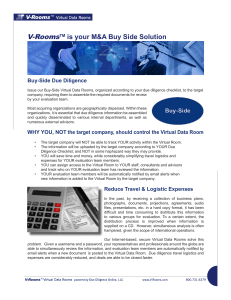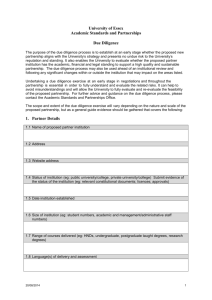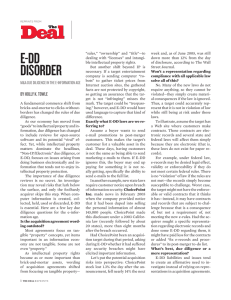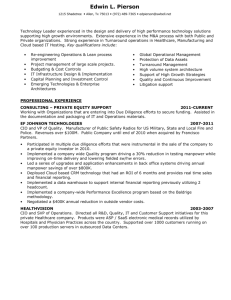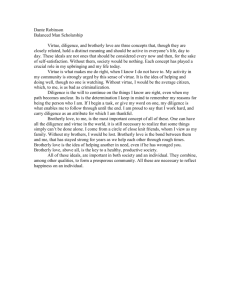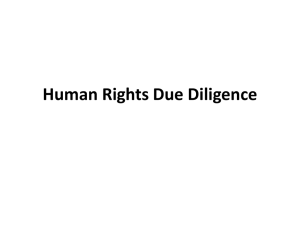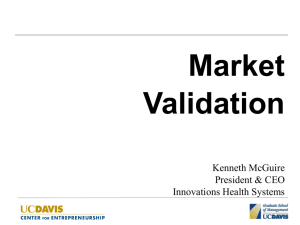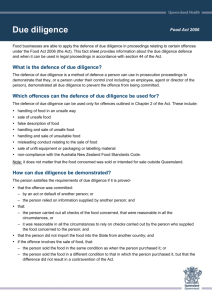Risky Business: Social Due Diligence and the Role of
advertisement
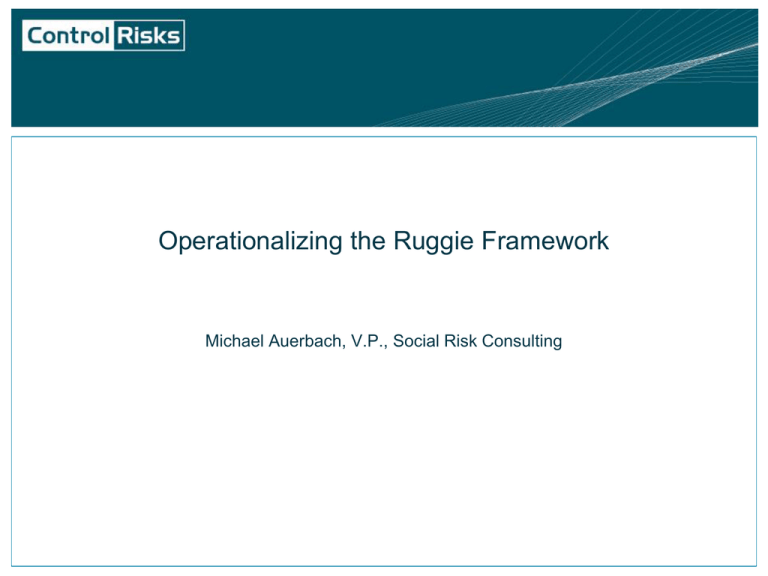
Operationalizing the Ruggie Framework Michael Auerbach, V.P., Social Risk Consulting What are human rights? Human rights are basic standards aimed at securing dignity and equality for all. International human rights laws constitute the most universally accepted standards for such treatment, but there is an intuitive aspect to the respecting of human rights that goes beyond laws and conventions. Put simply, what feels wrong is in all likelihood wrong. • “Whatever other differences may exist in the world, starting with the 1948 Universal Declaration, human rights are the only internationally agreed expression of the entitlements that each and every one of us has simply because we are human beings. Thus, securing respect for human rights must be a central aim of governance at all levels, from the local to the global, and in the private sector no less than the public.” – J. Ruggie *60% of Fortune 500 corporations reference the UDHR in their policies What’s the difference between CSR and Human Rights? • Top Down: (Philanthropy, Pollution Control, Environmental Stewardship, Donations, etc..) • Bottom Up: (universal, indivisible, interdependent and interrelated) • Irene Khan, Secretary-General of Amnesty International, noted: "Human rights are rooted in law.Respecting and protecting them was never meant to be an optional extra, a matter of choice. It is expected and required. It should be part of the mainstream of any company's strategy, not only seen as part of its corporate social responsibility strategy Framework: Protect, Respect, Remedy • Control Risks endorses the principles set forth by John Ruggie, United Nations Special Representative on the issue of human rights and transnational corporations, which outline: – That the primary responsibility to promote and PROTECT human rights and fundamental freedoms lies with the State, – That transnational corporations and other private enterprises are responsible for RESPECTING human rights in their practice, and – That access to effective REDRESS of grievances for individuals and communities claiming abuse is essential for the promotion of human rights. • The second principle, Responsibility to Respect, essentially calls upon transnational organizations to conduct Social and Human Rights Due Diligence. What is Social/Human Rights Due Diligence? The principle that, within a business context, a company is expected to ensure it operates in accordance with internationally agreed standards of fairness and reasonableness. In Protect, Respect, Remedy, John Ruggie defines Due Diligence as “the steps a company must take to become aware of, prevent and address adverse human rights impacts.” • “Look Before you Leap” – Appropriate care, risk management – Program to identify, manage, mitigate and eliminate risks to the company – Human rights due diligence: build on known and widely used management processes – Use due diligence to help a company to know if its meeting its responsibility to respect human rights. The Purpose of Social/Human Rights Due Diligence Measure the direct results and impacts of the operation Monitor the implementation of strategies, policies, and procedures Measure the efficiency of the management process Evaluate the policies and procedures Focus on challenges and opportunities Indicate the need for corrective measures The Process of Conducting Human Rights Due Diligence • Describe the proposed business activity • Consider the full cycle of the business • Map international, national legal framework, including standards, conventions, requirements from investors, company code of conduct, customary (or indigenous) laws and traditions • Describe the human rights conditions in the surrounding area • Engage with local stakeholders • Describe baseline conditions • Describe the view of multiple scenarios of the possible changes in business activity • Prioritize human rights risks • Make practical recommendations • Include company action and collaboration with government and local community members • Integrate plan into general management structure The Business Case for Human Rights Due Diligence • There is a strong business case for performing human rights due diligence. The main objective of conducting Human Rights Due Diligence is to identify, understand the corporate impacts in the field of human rights. And for a company to gain a thorough understanding of the impact of corporate activities, a better understanding of stakeholders perspectives, and ways to manage corporate impacts in the process that benefits all involved. Maintaining a good company and product reputation Effective risk identification and management Improvement of stakeholder relations Creating a legal and social license to operate Increased motivation and productivity of workers Understanding the society in which the company works Attractive investment climate Contribution to CSR and sustainable development
